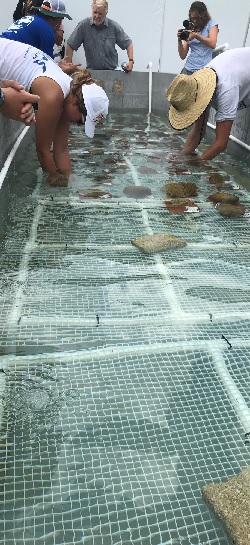 The Florida Fish and Wildlife Conservation Commission (FWC), National Park Service, The Nature Conservancy, Florida Department of Environmental Protection, University of Miami Rosenstiel School of Marine and Atmospheric Science and the National Oceanic and Atmospheric Administration led a mission to the Dry Tortugas June 30 – July 4 to continue coral conservation efforts.
The Florida Fish and Wildlife Conservation Commission (FWC), National Park Service, The Nature Conservancy, Florida Department of Environmental Protection, University of Miami Rosenstiel School of Marine and Atmospheric Science and the National Oceanic and Atmospheric Administration led a mission to the Dry Tortugas June 30 – July 4 to continue coral conservation efforts.
These and other partners continue to work on coral research and restoration to combat the multi-year stony coral tissue loss disease event affecting the Florida Reef Tract. This outbreak is unique due to its large geographic range, duration and the number of species affected, and the response is unprecedented with more than 60 government, academic and conservation partners.
Scientists are collecting corals in the Marquesas and Tortugas, the southernmost areas of the Florida Reef Tract that remain unaffected by the disease. Scientists located healthy corals in the Dry Tortugas National Park and rescued priority species to preserve their genetic diversity and serve as breeding stock for future restoration efforts both within and outside of the Park.
The healthy corals were placed in tanks at the University of Miami Rosenstiel School and will be transported to Association of Zoos and Aquarium facilities nationwide.
Florida’s Reef Tract is the only barrier reef system in the continental United States and hosts approximately 45 reef-building coral species. Florida’s corals support one of the most biodiverse ecosystems on earth and provide habitat for fish and invertebrates. They also offer coastal protection from storms and have pharmaceutical benefits. NOAA suggests that coral reefs in southeast Florida have an asset value of $8.5 billion.
The FWC will soon be launching a campaign encouraging sportsmen and women to join efforts to restore and conserve Florida’s precious coral reefs. Information will be available at MyFWC.com.
